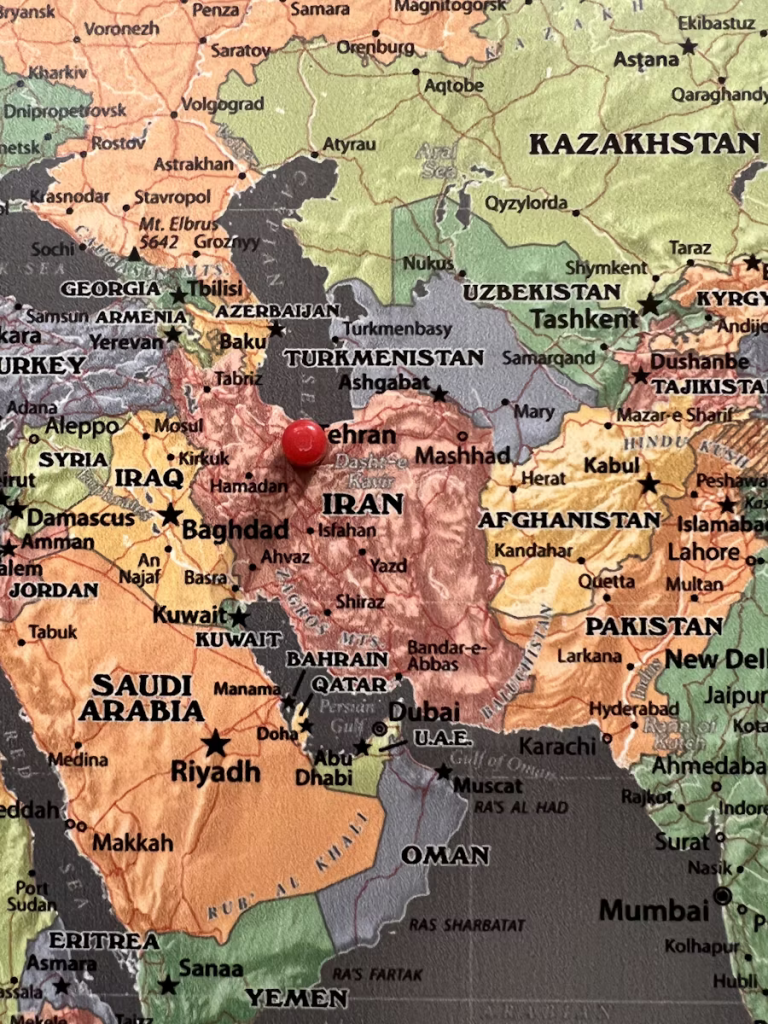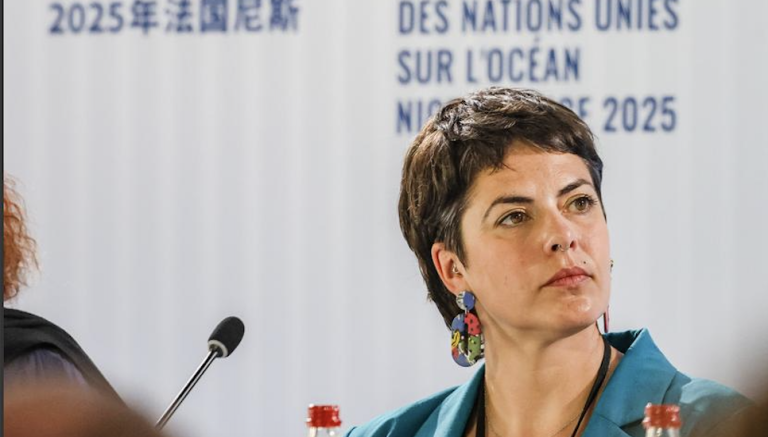Iran’s Nuclear Program: Security, Stability, and Global Implications
Written by Elisa Garbil – 01.09.2025
Iran’s nuclear program has long been a topic of global debate, intertwined with issues of national security, regional power dynamics, and international diplomacy. As Iran edges closer to advancing its nuclear capabilities, the risks associated with this trajectory extend beyond the borders of the Islamic Republic itself. A careful examination of these risks reveals not only the security threats posed to the region and the world but also the complex geopolitical and socio-political factors that influence Iran’s pursuit of nuclear technology. We have Dr. Kenneth Katzman on the podcast discussing Regional Implications of Iranian Nuclear Power.
Iran’s Nuclear Program: Origins and Intentions
Iran’s nuclear program dates back to the 1950s, initiated with the help of the United States under the Atoms for Peace program. However, its trajectory has shifted over time, particularly after the 1979 Islamic Revolution, which saw the country’s nuclear ambitions move from peaceful energy production to potentially weaponised technology. Since the early 2000s, Iran’s nuclear development has drawn the attention of international organisations, most notably the International Atomic Energy Agency (IAEA), and sparked concerns in the West, particularly in the United States and Israel.
Iran claims that its nuclear program is solely for peaceful energy production and medical purposes. However, critics argue that it is a means of developing nuclear weapons capabilities. The country’s refusal to halt its uranium enrichment activities, coupled with its development of advanced nuclear technology, has raised alarms. Analysts point to these advancements as indicative of a potential weapons program, despite Iran’s ongoing assertions of peaceful intentions.
The risks associated with this nuclear trajectory are multifaceted, involving not only the potential for military conflict but also the destabilisation of the entire Middle East.
National Security Risks: The Military Dimension
One of the most immediate risks posed by Iran’s nuclear program lies in its potential military applications. While Iran continues to assert that its nuclear ambitions are not geared toward weaponisation, its actions suggest otherwise. Advanced centrifuges, the enrichment of uranium beyond the levels necessary for civilian use, and the development of ballistic missile technology, all point to capabilities that could enable the country to construct nuclear weapons.
The national security implications for Iran are significant. A nuclear-armed Iran would fundamentally alter the balance of power in the Middle East. For years, Iran has faced regional threats from both neighbouring states and external actors, particularly the United States. A nuclear deterrent could provide Iran with greater leverage in protecting its sovereignty and deterring external interventions. However, this could also lead to an arms race in the region, with countries like Saudi Arabia, Turkey, and Egypt pursuing their own nuclear capabilities as a countermeasure.
A nuclear Iran might also trigger preemptive military actions by regional powers, most notably Israel. Israel, which views Iran’s nuclear ambitions as an existential threat, has previously threatened military strikes against Iran’s nuclear facilities. The 2025 U.S. strikes on Iranian nuclear sites, which targeted three major facilities, serve as a stark reminder of the potential for military escalation. Such strikes, whether carried out by the U.S. or Israel, could have catastrophic consequences for regional stability and escalate into broader conflict, involving other nations with vested interests in the region.

Regional Stability Risks: The Broader Middle Eastern Context
The Middle East is already a region marked by instability, with ongoing conflicts in Syria, Afghanistan, Israel, Yemen, and Iraq. The addition of a nuclear-armed Iran would increase the volatility of an already fragile region. Iran’s influence in regional conflicts, through proxy groups and direct military interventions, has made it a dominant force in the Middle East. A nuclear Iran could embolden Tehran to pursue even more aggressive strategies, potentially destabilising neighbouring countries further.
The risk of nuclear proliferation in the Middle East is another significant concern. If Iran successfully develops nuclear weapons, it could set a precedent for other nations in the region to pursue similar capabilities. Saudi Arabia has already hinted at its intention to acquire nuclear technology should Iran cross the nuclear threshold. This could lead to an arms race, with other countries in the region seeking to develop their own nuclear programs, further complicating efforts for non-proliferation.
Moreover, the possibility of a nuclear conflict in the Middle East cannot be discounted. A nuclear-armed Iran could lead to an escalating arms race, with regional powers arming themselves in response. This could result in the proliferation of dangerous nuclear technologies and increase the likelihood of miscalculations or accidental engagements that could lead to catastrophic consequences.
Global Diplomacy Risks: The Impact on International Relations
The diplomatic risks of Iran’s nuclear program are far-reaching, impacting both global non-proliferation efforts and the relationships between world powers. The 2015 Joint Comprehensive Plan of Action (JCPOA), commonly known as the Iran nuclear deal, was a diplomatic breakthrough that aimed to limit Iran’s nuclear activities in exchange for sanctions relief. While the agreement temporarily curbed Iran’s nuclear ambitions, the U.S. withdrawal from the deal in 2018 under President Donald Trump revived tensions and reintroduced risks of conflict.
The failure of the JCPOA has not only strained U.S.-Iran relations but has also had broader implications for international diplomacy. The reimposition of sanctions on Iran has weakened the global non-proliferation regime and further isolated Iran from the international community. The lack of a comprehensive diplomatic solution has led to a situation where Iran continues to pursue nuclear advancements without clear oversight, undermining efforts to maintain global nuclear security.
Iran’s nuclear program also strains relations with its regional neighbours, particularly Israel and the Gulf States. Israel, a longstanding opponent of Iran’s nuclear ambitions, has consistently sought international pressure on Iran to halt its nuclear development. The risk of military confrontation between Iran and Israel remains high, with the latter prepared to take unilateral action if it perceives an imminent threat.
Furthermore, the international community faces the challenge of balancing the desire to prevent Iran from acquiring nuclear weapons with the need to maintain stability in the Middle East. A nuclear-capable Iran would complicate the diplomatic efforts of global powers, especially the United States, Russia, and China, who are all involved in negotiating nuclear non-proliferation agreements with Iran.
Ironically, the West, as well as China and Russia, all have nuclear weapons. Asking for non-proliferation of another country because you disagree with their politics while simultaneously having nuclear arms yourself could be seen as hypocrisy. Logically, one would think no one should own nuclear weapons, including the West, China, and Russia. You cannot expect a country to abide by your opinion while not only showing you will not protect them when the time comes – even though this was the promise for nuclear disarmament (think of Ukraine) – but also refuse to descale your own nuclear weapons while asking Iran to do exactly that.

Conclusion: Navigating the Risks Ahead
Iran’s nuclear program presents significant risks to national, regional, and global security. While the country’s intentions remain a point of contention, the evidence of its pursuit of nuclear technology for military purposes cannot be ignored. The potential for military conflict, regional arms races, and destabilisation in the Middle East looms large, as does the risk of further isolation and diplomatic failure on the global stage.
In the face of these risks, the international community must seek innovative diplomatic solutions to prevent Iran from acquiring nuclear weapons while addressing the broader geopolitical tensions in the region. The challenge is not only to prevent Iran from crossing the nuclear threshold but also to ensure that the broader Middle East does not become a flashpoint for global conflict.As the situation continues to unfold, the world must recognise the high stakes of Iran’s nuclear ambitions and work collectively to mitigate the risks associated with a nuclear-armed Iran. Diplomacy, non-proliferation efforts, and regional stability initiatives must be prioritised if there is to be any hope of averting a devastating escalation in the Middle East. The West should also have a look at themselves and ask if demanding other countries to give up their potential nuclear weapons will work if they do not give up on their own nuclear weapons as well.





